X-Men: First Class part 2
We’ve met our rich-boy, poor-boy leads, and our story will turn out to be a romance between them. Because X-Men: First Class is a love story, it is allowed two protagonists. Generally speaking, a love story is weighted in the favor of one participant or the other, but First Class‘s seems genuinely evenly-balanced. So, if we have our two protagonists, the question immediately rises: what do the protagonists want? Erik’s desire is clear, and stems from privation: he wants his mother back. Xavier’s desire, on the other hand, stems from comfort and plenty: he wants all those who are unusual to feel safe and welcome. (It’s an interesting question how safe Xavier feels in his estate, if his mother is cold and distant.)
But before we get to the love story we need to meet our primary antagonist, Dr. Klaus Schmidt. Dr. Schmidt, before he even sits down to speak to Erik, tells us that he is “not a Nazi.” He listens to Edith Piaf, pooh-poohs the Nazi goals of blond hair and blue eyes and offers Erik chocolate. He’s playing “good cop,” and in fact is positioning himself as Erik’s new father in this wartime drama. It takes a special kind of man to pretend to be a Nazi to the extent Schmidt does, and we will learn more about that later.
Schmidt wants Erik to move a coin with his special metal-manipulating powers. “A little coin” he says. The little coin, of course, is a Nazi coin, complete with eagle and swastika, and will be linked later to Nazi gold, stored in Swiss banks. War, the movie reminds us, is often a business decision. Nations are invaded and people are rounded up and killed for the sake of profit. As of 1944, business is booming in Schmidt’s line of work, and the coin is the symbol of his power and arrogance. “A little coin” is negligble, but we will see that there are things worth less to him.
Erik, unfortunately, cannot act upon the coin. The Nazi coin, Schmidt’s symbol of power, is too much for him. Schmidt rings a bell and, in a stunning reverse shot, we see that Schmidt’s cozy book-lined office also includes a huge operating theater. Guards bring in Erik’s mother and Schmidt unceremoniously shoots her dead and we learn that the key to Erik’s talent is, like Bruce Banner’s, anger. Erik, in his rage, destroys everything metal in Schmidt’s office, then kills the guards, then detroys the operating theater. He is now a murderer. He has gone from being a victim to a murderer. A righteous murderer perhaps, but still a murderer. He didn’t yank Schmidt’s Luger out of his hand and shoot him, and he didn’t even move the coin. And I’m guessing Schmidt knew all along that anger might be the trigger for Erik’s talent. He’s choosing a dangerous road for a volatile protagonist, and he gives him the coin as a kind of payment for the loss of his mother. He knows, he actually knows that the coin will keep Erik’s anger simmering at the boiling point, where Schmidt needs it to be. As it happens, this isn’t a dangerous road for him at all; we will find that Schmidt is uniquely suited to be the tormentor/mentor of a furious, metal-bending child.
In a nice little graphic metaphor, we see the Nazi coin in Erik’s hand become the main title of the feature. First Class implies, in part, the “first class” of Xavier’s some-day school for mutants, but to find the X symbol on the back of the Nazi coin also implies that Erik and Xavier are, as the cliche goes, two sides of the same coin. One is driven by loss and privation, the other is inspired by wealth and privilege, but they are both wellsprings of, well, change, to make a metaphor a pun.
Now Erik is all grown up. We don’t know how he spent the rest of WWII under the tutelage of Dr. Schmidt, what we know now is that Schmidt has given birth to a revenge-fueled young man with impressive skills. He’s still got Schmidt’s coin, and it still fuels his anger, except now he is looking for Schmidt in Switzerland. He still has the coin, he never lost it, he still carries it with him and thinks about it. He can manipulate it easily now with great dexterity.
While Erik broods in Geneva, thinking about planting that coin into Schmidt’s forehead, paying him back, so to speak, for the price Schmidt paid for Erik’s mother, Xavier is at Oxford, using his incredible psychic powers to try to get a leg over with a comely blonde. Again, the contrast between leads on seemingly antithetical paths. Xavier’s youthful idealism seems to have stopped, for the moment, at Raven, who sulks in the background while Xavier chats up girls. We don’t know Erik got through WWII, but it’s even more remarkable to think how Xavier got from Westchester to Oxford with Raven following him around. Did he just announce to his mother one day “Mum, this is Raven, she’s a naked blue girl and she’s going to live with me from now on”? Did Raven want to go to Oxford, or is she a legacy admission because of her friendship with Xavier? For that matter, is Xavier actually smart enough to get into Oxford, or did he simply cheat on all his exams?
Xavier employs a lecture on mutation to seduce the blonde. This, of course, is nothing but exposition, put here for the benefit of confused viewers who have wandered in from the street, unaware of what the X-Men are. The screenwriter has done the wise thing and placed this exposition in the form of a joke, and in fact has the blonde call attention to it. Raven, who holds no patience with exposition or Xavier’s seduction techniques, interrupts.
What does Raven want? Raven, remember, is a horrible blue scaly naked monster. Xavier can expound all he wants on “mutant freedom,” the fact is that no society would ever accept Raven as anything but a freak. The reason being, of course, rooted in her power: she can create an alluring, deceptive appearance, but it’s only disguising her true appearance. Raven must be always naked, exposed, and simulatanously always in costume, pretending to be someone else.
I love what the screenplay does next — it sends Raven home to brush her teeth. What a perfect image of superhero discontent. It’s so great and yet so understated it goes by almost unnoticed. What’s the point of having superpowers, the image says, if you still have to brush your teeth? The acting coach says to the student “What did your character have for breakfast?” and here we see the exercise made literal. Raven’s life isn’t jetting about the world, mimicking people and getting into secret installations, it’s following Xavier around like a third wheel and brushing your teeth. This image is, for me, the essence of the X-Men appeal — the X-Men stand out in the superhero firmament because they all have incredible, world-changing powers but they’re all incredibly messed-up individuals, every single one of them. They could change the world, except they’re too neurotic to make it to the grocery store.
So Raven is concerned with her looks, which Xavier can’t understand, which is, of course, the other side of his expansiveness — he can’t understand why people need things he has in abundance.
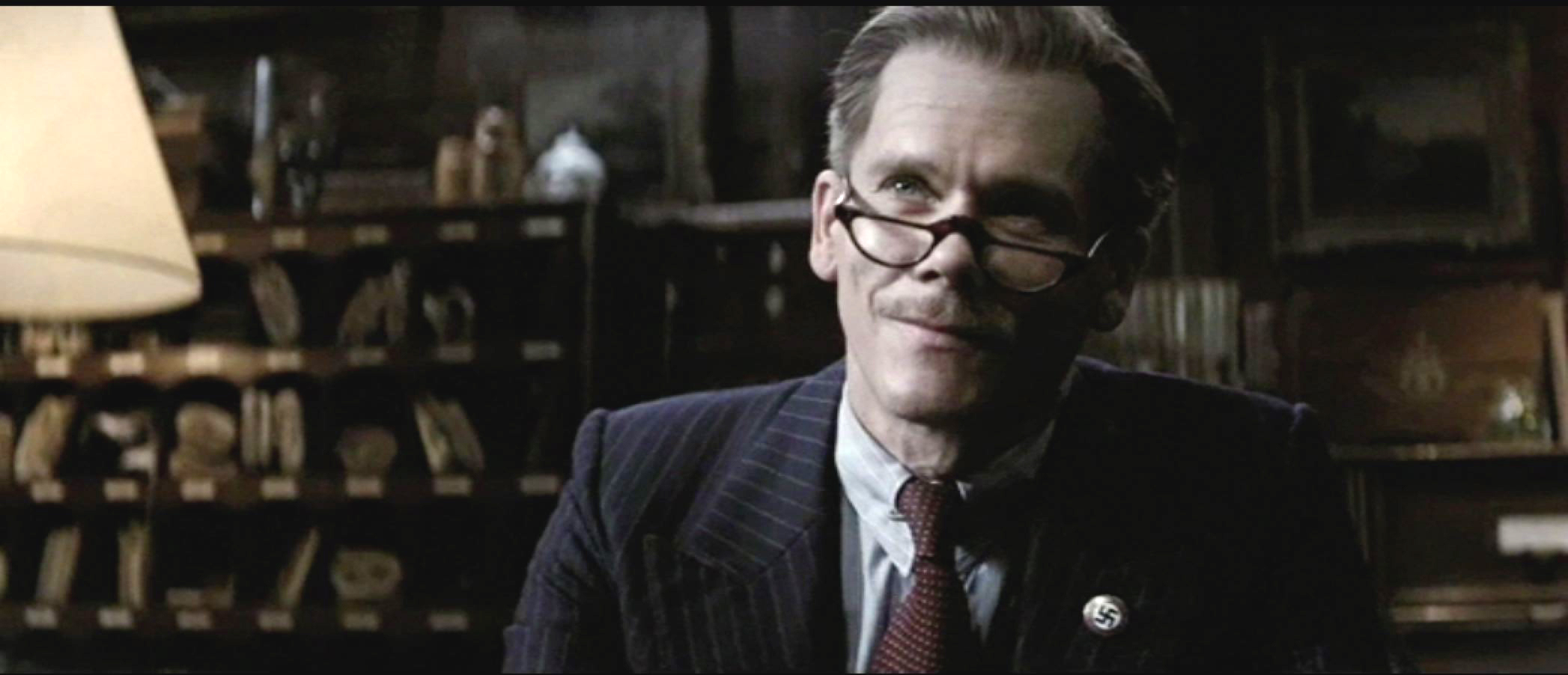
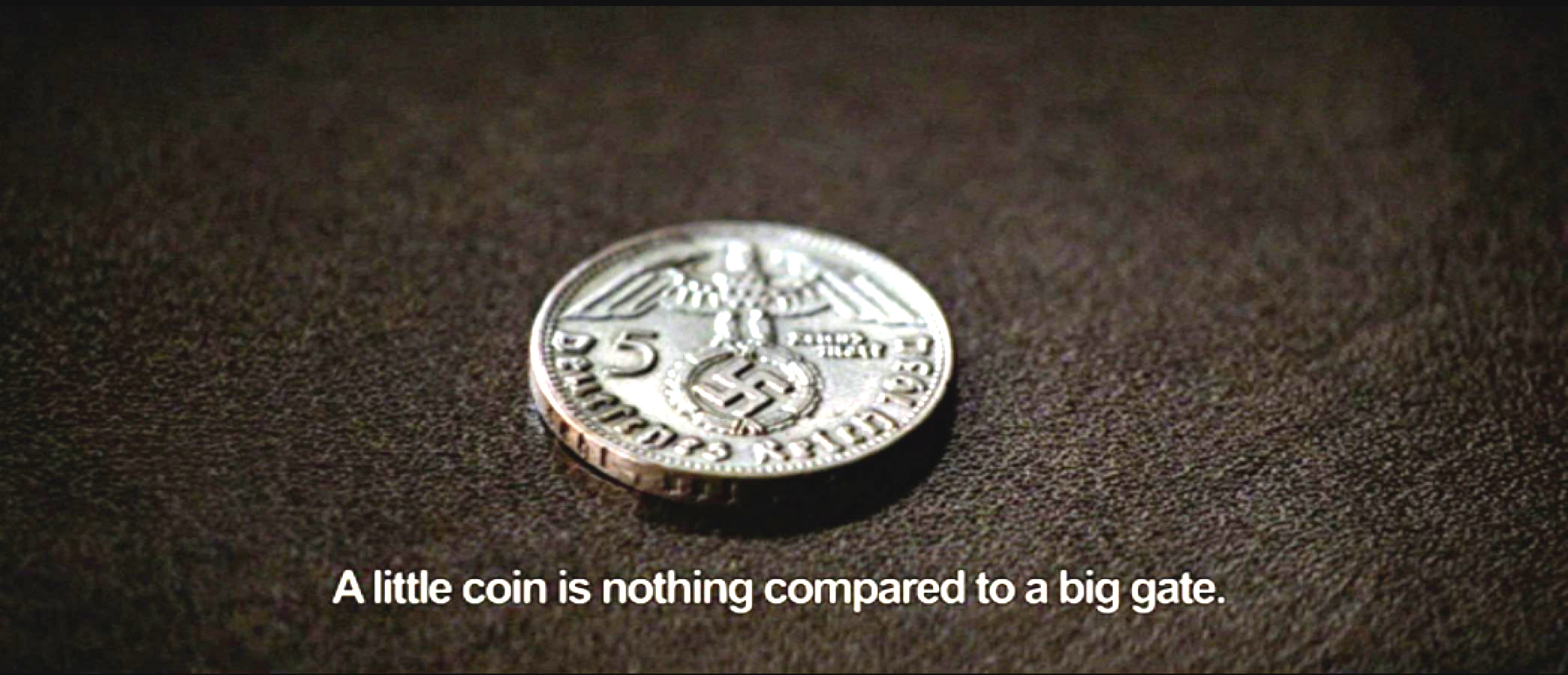

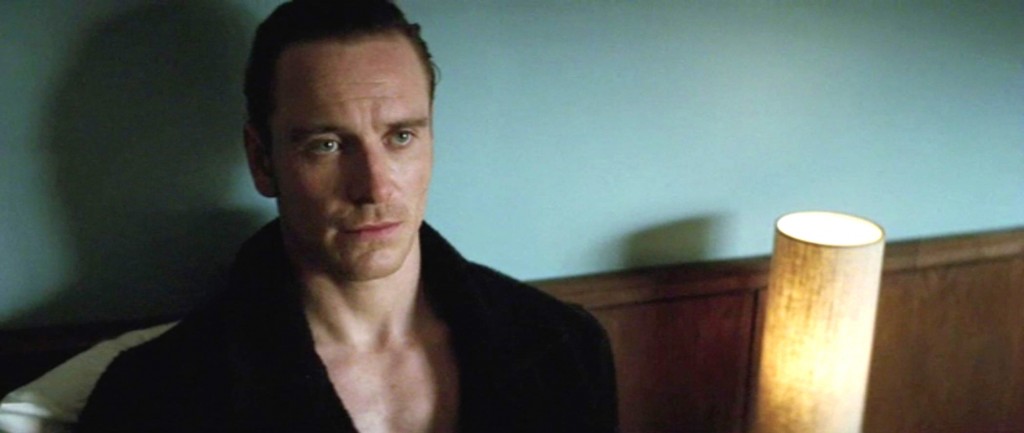
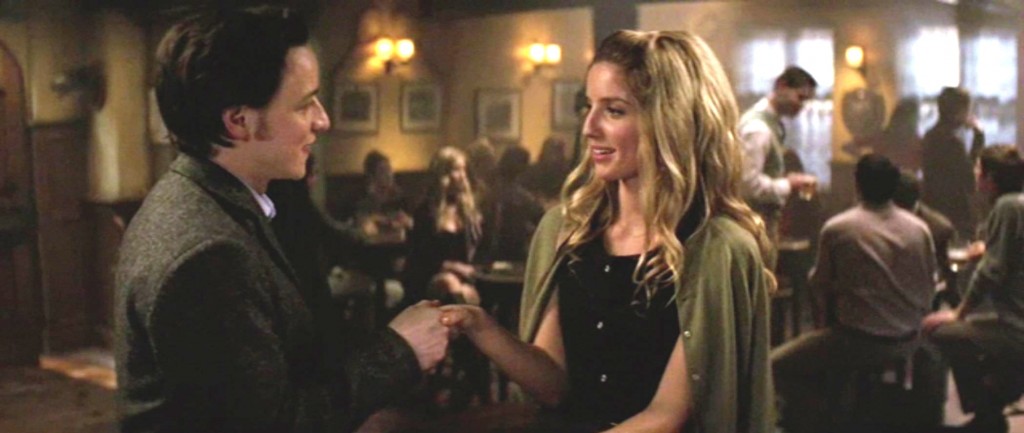
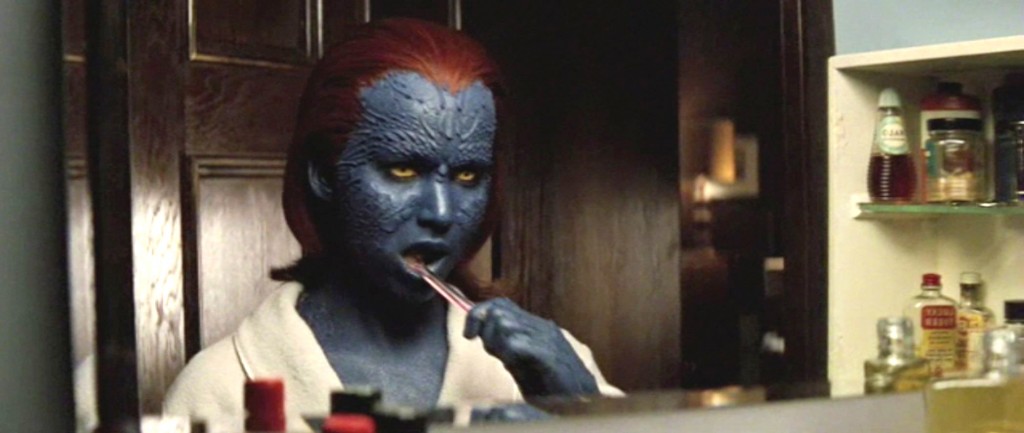
I wonder if Dr. Klaus Schmidt is the younger brother of Johann Schmidt, aka The Red Skull. They’re practically in the same line of work.
If memory serves me right, the opening scene with the concentration camp gate in X-MEN: FIRST CLASS is a close reprise of the first scene of the 2000 film X-MEN. In the first film, no one in the camp seemed to recognize the significance of the gate-bending, but FIRST CLASS reveals that, nope, Schmidt was watching, too.
I believe you pointed out that the Martian Manhunter, as a shapeshifter, is naked all the time, too. It seems to raise a question about the nature of nudity — if J’onn J’onzz or Raven Darkholme has turned their skin to cloth-like fabric and their you-know-whats are no longer exposed, are they actually naked?
I haven’t gone back to check the original scene to see if it’s actually a shot-for-shot recap, but it’s very close — to the point where they actually use the same music from the original score (which Michael Kamen wrote, while Henry Jackman scored XMFC).
And yes, the shapeshifting question is an interesting one. If you touch fabric while they’re shifted like that, are you actually touching skin? How exactly does the process work?